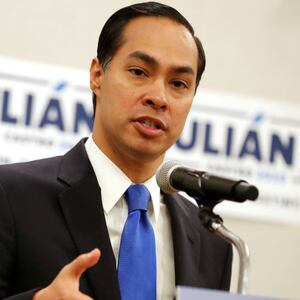Where to now, Julian?
Julian Castro won last week’s first Democratic debate. With 10 people on stage, Castro only spoke for about eight minutes. That’s the political equivalent of speed dating. But even in that short amount of time, the former U.S. secretary of housing and urban development managed to raise his national profile, make a good impression, and win over some Democratic voters.
Running for president is about establishing your personal brand, and laying claim to the issues that distinguish you from others.
Over the last several weeks, Castro’s campaign has fired off one policy proposal after another—on immigration, education, police reform, health care, Latin America, etc.
The 44-year-old graduate of Stanford University and Harvard Law School is known for “wonking out” and doing his homework. He’s used to knowing the answers. But running for president isn’t a spelling bee. His policy proposals may have impressed the activists, but what really sets him apart is that he’s what I would call the “go there” candidate.
Name a touchy subject—from providing publicly funded abortions to transgender Americans to calling out police violence against African-Americans—and, while some of his opponents will duck the issue or dodge the question by speaking a few words of Spanish, Castro goes right there.
That’s how Castro can break out from the crowd—by saying what others won’t say, and raising issues others won’t go anywhere near.
Yet, we all know that Castro’s prospects in this race won’t rise or fall based on Policy X or Plan Y. His real hurdle—and the only one that matters—is about trying to be the first. Like Marco Rubio and Ted Cruz before him, he’s trying to become the first Latino president. But unlike Rubio and Cruz, Castro is Mexican-American.
When we’re discussing immigration, that distinction matters.
I remember the reader who once accused me of opposing border walls because “you want to bring in all your cousins.”
There was also the sweet elderly woman who many years ago wrote an email telling me that I had no right to opine on immigration because: “Asking a Mexican how to secure the border is like asking the Germans for help in planning the D-Day invasion.”
In fact, one of the people who helped plan and orchestrate that famous military operation was a German-American named Gen. Dwight D. Eisenhower.
The point is, the reader was convinced I was the enemy and that—as a Mexican-American—my loyalties lay south of the border.
American Jews have that story committed to memory. Throughout the 20th century, they were hit with accusations of having “divided loyalties” and not being sufficiently American.
Now Castro has to walk that gauntlet. He’s trying to make a specific kind of history by being elected the country’s first Mexican-American president, and—by winning the first debate—he’s already gone where no Mexican-American has gone before.
Over and over again, he’ll have to reassure Americans—especially white Americans—that he’s not going to give away the store on immigration and push for an “open border.” Polls show that, if anything, Americans want the U.S.-Mexico border fortified.
Just like Barack Obama had to constantly reassure those voters who feared that electing an African-American president might harm the progress of white Americans.
These assumptions are offensive, but not all that original. We’ve seen this movie before.
In 1960, John F. Kennedy made his history by being elected the nation’s first—and incredibly, to date, only—Catholic president. To do it, he had to get past Protestant fearmongering in states like West Virginia where folks who would have been the equivalent of the Twitter trolls of today distributed leaflets warning that a Catholic president would take orders from the Vatican.
By the way, the only good thing about prejudice is that it can be overcome. Kennedy won West Virginia.
As a Catholic, I’ve been thinking about JFK a lot lately. I’ve often wondered what it must have felt like for Irish-Americans—given all the crap they put up with since they began arriving in large numbers in the 19th century — to watch the first televised debate between Kennedy and Vice President Richard Nixon on Sept. 26, 1960.
What it must have been like for the Irish to see Kennedy shine, make his peeps proud, and grab them some hard-earned respect.
Now I don’t have to wonder anymore. Because, thanks to Castro and his debate performance, I know.
Meanwhile, Castro is also learning what it’s like to be a target and have to reckon with a much higher level of scrutiny. And no, not every question he’ll get will be fair—or even logical.
Just look at what happened Sunday when Castro appeared on ABC News’ This Week with George Stephanopoulos.
Given that, in the second debate, all of the major Democratic candidates raised their hands in support of providing health insurance to undocumented immigrants, Stephanopoulos asked Castro:
“Did you give an opening to the Republicans?”
Castro rejected that contention, pointing out that the undocumented pay a lot in taxes, and already get free health care—via the emergency room—when prevention would be cheaper.
Stephanopoulos then asked if—by giving the undocumented health care and making illegal entry a civil violation like it used to be instead the crime it is now—this didn’t amount to “open borders”?
Here we go again.
We haven’t heard the last of this kind of talk. We’re going to hear variations of it for months to come, whenever Castro is asked about immigration.
That’s because, from this point on, the next challenge for Castro isn’t just being able to raise enough money from the 130,000 donors required to meet the higher threshold for the third debate in September.
It’s also about something bigger, something historic. It’s about being able to make everyone from voters to media to influencers comfortable with the idea of doing something they’ve never done before. And that is never easy.
In the end, I think Americans will surprise us. I think Castro will—even in heavily white early-voting states like Iowa and New Hampshire—do better than most people expect or current polls reflect.
Besides, Castro doesn’t have to win all the marbles to make his mark on history. All he needs to do is stay on message, keep tackling thorny issues and saying what others won’t say, and show Americans that he is listening to their problems and he has solutions to them.
Castro owes a lot to this country, and he wants to make it better. And, whether his critics accept it or not, that is a concept that is profoundly American.







